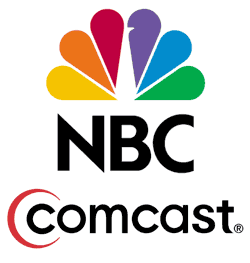
It looks like Comcast is well on its way to becoming part-owner of NBC-Universal.
According to a post at the New York Time DealBook blog:
General Electric has reached a tentative agreement to buy Vivendi’s 20 percent stake in NBC Universal for about $5.8 billion, helping clear the path to a sale of the television and movie company to Comcast, people briefed on the matter told DealBook.
This is one of those slightly worrisome business dealings that only gets worse the more one thinks about it.
While NBC may be faltering a bit in the regular TV network ratings, it still holds a lot of broadcast clout. Add in the stable of entertainment properties that it’s Universal branch brought in and the online suite of destinations (like Hulu) and it’s a major player across the new media board.
Comcast, of course, the largest of the big cable companies that now bring television, Internet, and voip phone service to our doorsteps.
The combined NBC-Comcast behemoth would be, without question, one of the most powerful media conglomerates around. Check out this bit of analysis from Media Daily News:
“You become a cable network,” he added. “You become the most powerful network. You would eclipse USA Network.” Malone was one of the main architects of the U.S. cable TV industry in the 1980s and 1990s — especially with his dominant cable system operation, Tele-Communications Inc.
That’s from someone who definitely knows what he’s talking about.
In the paragraph before the one quoted, Malone mentions that the best way to get to that point is for NBC to divest itself of it’s local affiliates. Not something easy to do, but not an impossibility.
Mergers like this do more to hurt the diversity of news, entertainment, and information in general than anything else around. With fewer providers, we’re left with fewer choices. And here we even have the potential for a tremendous loss of jobs (if local affiliates are, indeed, axed in the name of more power and profits).
Will the FCC step in and say something about this? That’s kind of up in the air. Over the last decade, the FCC has been going back and forth on its media ownership and saturation rules. Those are coming up for discussion again. According to the LA Times Blog Company Town:
That the FCC is looking at reevaluating how it measures media could be a good or bad thing for the industry depending on what direction the Obama administration wants to take. The consensus is that his FCC chairman, Julius Genachowski, will look more harshly on media concentration than the Bush and Clinton administrations did.
Free Press has set up a campaign to stop the merger. Josh Silver, the executive director of Free Press, said in a statement:
“Approval of such a merger would trigger a new wave of mega-mergers, as other giants like News Corp. and Disney bulk up to exert more control over new media. We don’t have to speculate about what this would mean for consumers. Decades of disastrous media consolidation have already given us higher prices, fewer independent and local voices, and the same cookie-cutter content wherever we go.”
On this, I tend to agree with him.
We’ve seen very clearly what big business can do when it gets “too big to fail”. For years we’ve let our media companies–old and new–glom together into larger and larger homogeneous hunks, all the while sliding into more and more partisan places. Polarization is not diversity. Homogeneity is not choice. And lack of competition does not breed quality. (Though these days I often wonder what does breed quality in the media.)
I’m going to wait for a few more details to come out over the next few weeks before I really start to worry, but I will be watching. If you care about your media–be it online, in print, or over the airwaves–I’d recommend you keep an eye out, too.
If this goes through and bad things happen, we have only ourselves to blame.

Leave a Reply